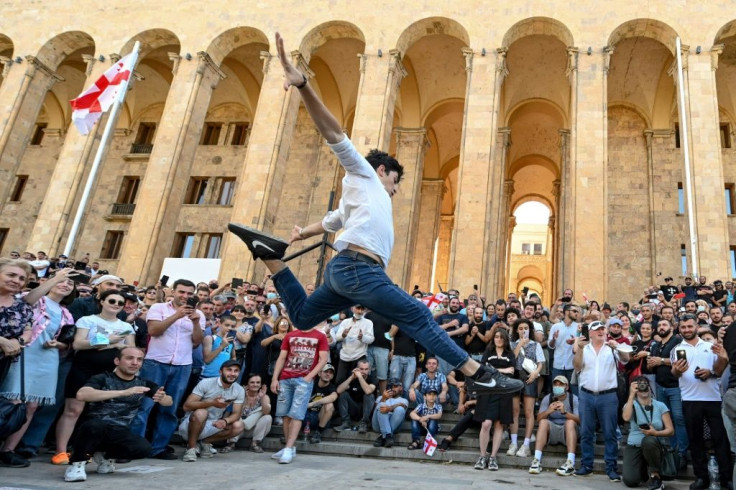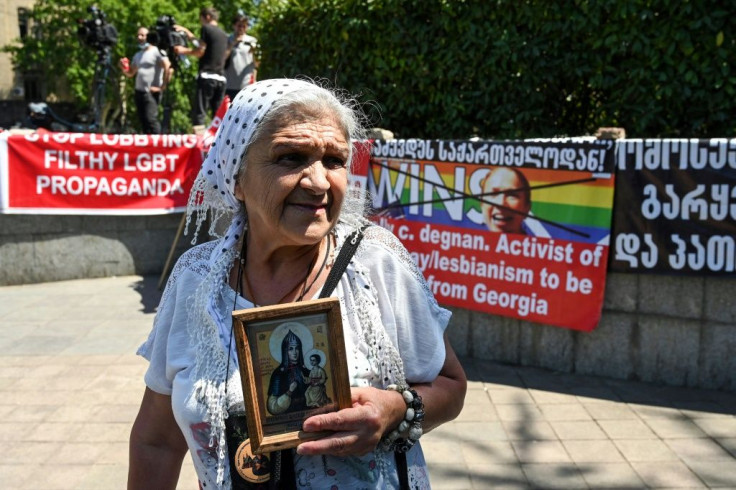Georgia LGBTQ Activists Cancel Pride March After Clashes
LGBTQ activists in Georgia said Monday they had been forced to cancel a planned Pride march after mobs assaulted activists and journalists and clashed with police, while the prime minister spoke out against the event.
Pride events are still controversial in Georgia, a conservative country where the powerful Orthodox Church has previously butted heads with Western-leaning governments over progressive social issues.
On Monday morning, hundreds of anti-LGBTQ protesters including activists from a small pro-Russian party removed a European Union flag outside parliament and vowed to disrupt the Pride march scheduled later in the day.
Violent protesters later clashed with police and assaulted dozens of journalists at several locations in the capital Tbilisi, including the United Nations representative office to Georgia.
"We cannot risk human lives and take to the streets, which are full of violent attackers," organisers said in a statement on Facebook, announcing that "the march will not be held today".
Their statement added that the offices of the Tbilisi Pride organisation were also raided by "homophobic attackers".

The Orthodox Church had called on supporters to gather Monday afternoon for a public prayer against the Pride march.
Scepticism also came from Prime Minister Irakli Garibashvili who earlier in the day spoke out against the march, describing it as "unacceptable for a large segment of Georgian society".
The "holding of the so-called Pride march is not reasonable as it creates the threat of civil confrontation", Garibashvili told a cabinet meeting.
He also accused opposition parties and exiled ex-president Mikheil Saakashvili of attempting to provoke civil unrest.
"The opposition headed by Saakashvili is behind the Pride march, which is aimed at provoking civil confrontation and turmoil."

Critics have accused the ruling Georgian Dream party government of tacitly supporting homophobic and nationalist groups.
Those organisations are seen as supporters of the ruling party and have staged protests against pro-Western opposition parties.
Pride organisers denounced Garibashvili's "shameful" statement, saying it encouraged homophobic sentiments, and accused his government of failing to "protect fundamental human rights".
Georgia's rights commissioner, Nino Lomjaria, said the prime minister had "exacerbated the already tense situation".
The US and EU diplomatic missions in Georgia, as well as the embassies of 16 more countries, issued a joint statement condemning the violence.
"We condemn today's violent attacks on the civic activists, community members and journalists, as well as the failure of the government leaders and religious officials to condemn this violence," the statement said.
Last week, the embassies urged the Georgian government to "secure the right to peaceful assembly for all people in Georgia without exception".
Georgian society has in recent years become gradually more accepting of liberal social views, and the country has hosted several Pride events.
"We feel growing solidarity from Georgian society and from politicians, but there are still violent homophobic groups," Pride organiser Giorgi Tabagari told AFP.
In 2019, hundreds of far-right activists burned rainbow flags in Tbilisi, protesting against the screening of an Oscar-nominated gay-themed film.
In 2013, thousands of ultra-conservative supporters of the Orthodox church disrupted a Tbilisi rally to mark International Day Against Homophobia.
Georgia decriminalised homosexuality in 2000, and anti-discrimination laws were adopted in 2006 and 2014.
© Copyright AFP {{Year}}. All rights reserved.





















